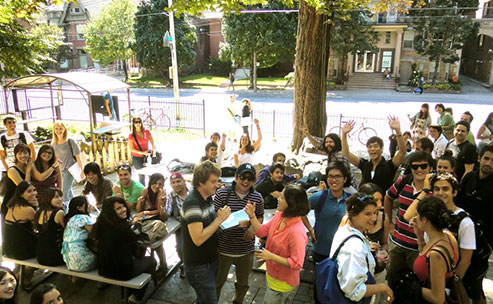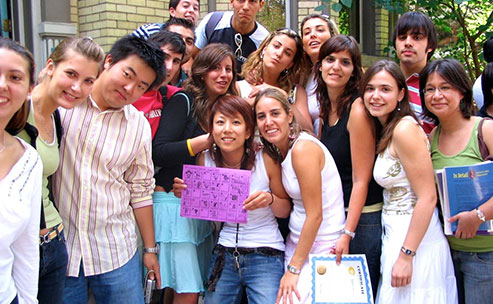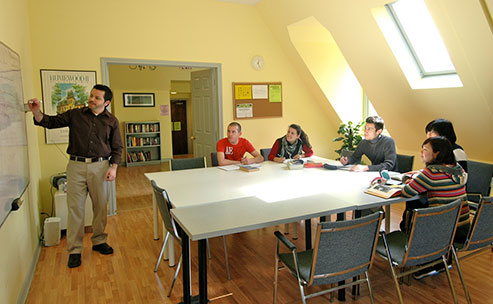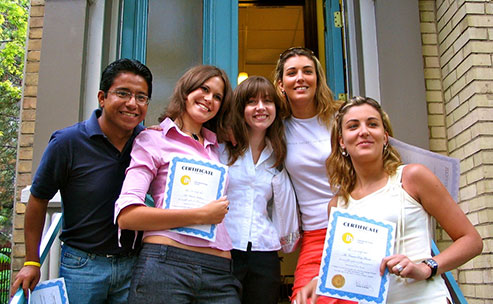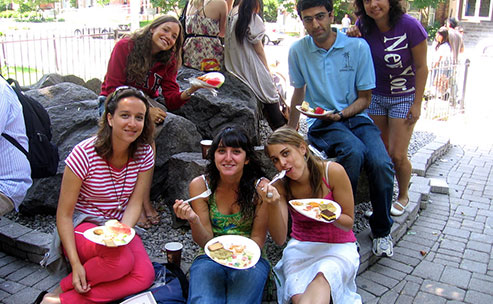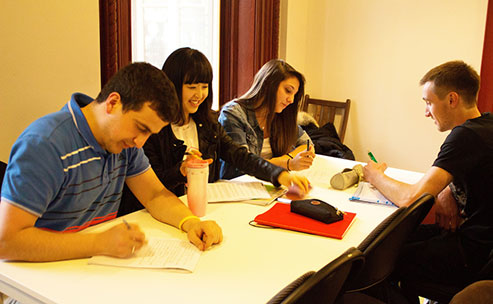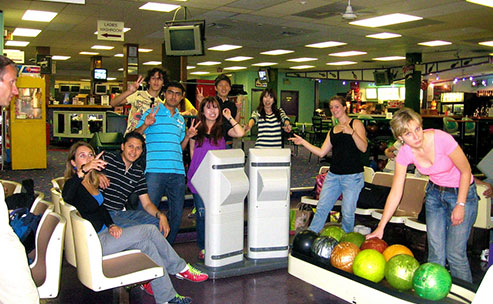Course Content
CELTA Certificate Program (4 Weeks, 120 Hours):
The full-time Diploma Program is a very intense 4 week program! There is quite a lot of outside work that needs to be completed in order to be successful in the program. The course is designed with a balance between practical and theoretical learning. Students will receive six teaching practices during the program and will be able to observe the ESL classes during the day. We recommend that students who enroll in this program do not have any other work or personal commitments.
Practicum:
- Teaching Practices are completed outside of the course time
- Practicum classes take place at either 2pm to 4pm or 3:30pm to 5:30pm. In some cases, weekend and evening classes may take place
- 6 practicum classes must be taught
- Practicum begins in week 2 of the program and extends outside of the 4 weeks of study
CELTA Diploma
The School is registered in Ontario as a Private Career College with the Ministry of Training, Colleges and Universities (MTCU). The program provided in Toronto is recognized by TESL Canada, assuring that the course content, delivery, and practicum meets industry standards and that all employees involved in the program have the proper qualifications. The 4 Week Program is recognized worldwide as well, as it complies with international standards which ask for 120 hours.
Program Requirements:
- Excellent command of the English language in all areas (CAE or equivalent for Second Language speakers) Academic IELTS score of 7 or greater.
- 20 years or older (exceptions may be made for 18 or 19 years of age)
- Minimum of a High School Diploma (post-secondary degree is preferred) Please note that although admission into the program does not require a university degree, to teach English in Canada (TESL Canada certified) and in some countries around the world, a university degree is required
- A keen desire to teach English as a career
- Completed pre-interview tasks and Pass the admissions interview
Course Aims
Once a graduate, you can expect to know:
- How to manage an ESL classroom
- How to lesson plan with confidence (using a variety of teaching approaches) and be able to meet your Teaching Objectives, as well as your Personal Teaching Objectives
- English grammar and ways to effectively teach a variety of grammatical points at different levels
- Phonology (IPA chart), ways to teach pronunciation successfully (stress, syllables, intonation, etc.)
- How to assess your students' needs
- How to motivate your students
- How important Socio-Cultural awareness is in the ESL classroom
- How to adapt to and accommodate different learning styles
- Different ways to error correct
- How to prepare your resume (when applying for ESL teaching positions), what to expect during an interview and what to ask in an interview
Syllabus:
- Methodology / Approaches: Grammar Translation, Audio-Lingual, Communicative Language Teaching, Total Physical Response, Natural and Direct Approach, Task-based Learning and Lexical Approach
- Lesson Planning: ESA, Task-based, PPP, TTT and Situational Presentation.
- Teaching Skills: Speaking, Listening, Reading and Writing. Teaching grammar, vocabulary, pronunciation / intonation and slang / idioms
- Grammar Tutorials: Parts of Speech, Count and Non-Count Nouns with Quantifiers, Verb Tenses, Modal Verbs, Conditional Sentences, Active Voice and Passive voice
- Phonology and Pronunciation Workshops: IPA Chart, Vowels and Consonants, Manner and Place of Articulation, Word and Sentence Stress, Syllables, Intonation, Connected Speech (Assimilation, Elision)
- Knowing Your Learners: Auditory, Kinesthetic and Visual. Multiple Intelligences, Motivation, Communicating with Learners, Needs Assessment and Socio Cultural Awareness, Young Learners
- Classroom Management: Role of the Teacher (Monitoring, Participating or Vanishing), Giving Instruction, Seating, Pair / Group / The School of Work, Eliciting Techniques, Concept Checking, Board Use, TTT vs. STT, Problems in an ESL classroom and The School unions
- Error Correction: Learn when and how to error correct. Fluency vs. Accuracy, Writing, etc.
- Language Acquisition: First and Second
- Activities, Techniques, Warmers and Fillers: Lexical Games, Storytelling, TV, DVD, Songs and Music, Computers and Internet, etc.
- Employment Workshop: (during the last week of the course)
- Supervised Teaching: (On-site and prearranged) 6 hours teaching ESL students. Post lesson feedback session
- You will complete four written assignments (each 750–1,000 words). These focus on: analysing and responding to adult learner needs, analysing language for teaching purposes, teaching language skills, and reflecting on classroom teaching
How you will be assessed
You will be assessed throughout the course and there is no final examination. The two types of assessment are:
- Teaching practice: You will teach for a total of 6 hours, working with adult classes at a minimum of two levels of ability. Assessment is based on your overall performance
- Written assignments: You will complete four written assignments (each 750–1,000 words)


 ITTO School's Map
ITTO School's Map MEXICO
MEXICO Guadalajara
Guadalajara Puerto Vallarta
Puerto Vallarta Chiapas
Chiapas Playa del Carmen
Playa del Carmen ARGENTINA
ARGENTINA Buenos Aires
Buenos Aires ITALY
ITALY Florence
Florence CANADA
CANADA Toronto
Toronto Vancouver
Vancouver CHINA
CHINA Shanghai
Shanghai COSTA RICA
COSTA RICA Manuel Antonio
Manuel Antonio Playa Samara
Playa Samara CZECH REPUBLIC
CZECH REPUBLIC Prague
Prague FRANCE
FRANCE Toulouse
Toulouse GUATEMALA
GUATEMALA Antigua
Antigua PERU
PERU Cusco
Cusco SPAIN
SPAIN Barcelona
Barcelona Madrid
Madrid THAILAND
THAILAND Chiang Mai
Chiang Mai USA
USA New York
New York Chicago
Chicago Miami
Miami Online TEFL Programs
Online TEFL Programs Compare Course Features
Compare Course Features



